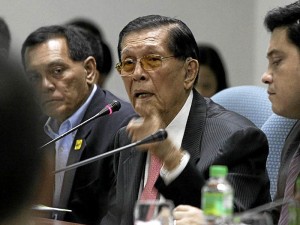Enrile’s Charter change solution to PH security draws mixed reactions
Why not give defense second priority in government spending instead of amending the Constitution to put it over education at the top of the budget?
Colleagues made this counteroffer to Senate President Juan Ponce Enrile on Monday in response to his suggestion that the Constitution be amended to make it more “flexible” and enable the government to deal better with security issues, such as defending the Philippines’ territorial claims in the West Philippine Sea (South China Sea).
“If we want higher spending for the military, then there is no obstacle in making that the priority, but always after education,” Senator Aquilino Pimentel III said in a text message to the Philippine Daily Inquirer. “By investing in education, we can never go wrong.”
Enrile’s mention of constitutional amendments in a radio interview on Sunday drew negative reactions from the House of Representatives and Malacañang.
House Majority Leader Neptali Gonzales II on Monday said that the House had no time to handle constitutional amendments with only a year left before the terms of its members ended.
“The proposal of Senate President Enrile is very noble, but I don’t think we have enough time to push Charter amendments,” Gonzales said. “We are running out of time because Congress will be very busy deliberating on next year’s national budget and, of course, candidates are now preparing for the 2013 elections.”
Not priority
In Malacañang, presidential spokesperson Edwin Lacierda reiterated to reporters that constitutional amendments were not among the priorities of President Benigno Aquino.
Lacierda said there was no urgency to disturb the Constitution despite the country’s weak defense capabilities.
“What we are doing right now is to create a minimum defense position,” he said. “That’s why we are acquiring military hardware.”
The government is asking the United States for assistance in modernizing the military. But what the United States is sending over are secondhand cutters, good only for patrolling the Philippines’ borders in the West Philippine Sea.
Congressional control
Pimentel said that Congress, with its power of the purse, possesses a degree of control over which sectors to prioritize, a choice that can change depending on the situation.
Senator Antonio Trillanes IV said that while he agreed with Enrile that constitutional amendments were needed, the Philippines’ territorial dispute with China could not justify any initiative to amend the Constitution.
In his radio interview, Enrile expressed frustration that the government had failed to deal with national security issues because of the nonnegotiable priority the Constitution gave to education.
He blamed the Philippines’ military weakness on the priority given to education in budgeting.
Peaceful resolution
But Trillanes, a former Navy officer, said constitutional amendments took time to accomplish. “A more prudent alternative is to peacefully resolve our differences with China and revive our relationship as economic partners and not (as) enemies,” he said.
“Besides, it is impossible to engage China in an arms race so increasing military spending may be a futile exercise,” Trillanes added.
Senator Gregorio Honasan, vice chairman of the defense committee, agreed that constitutional amendments should be a long-term solution, and he did not see the initiative “happening immediately.”
Honasan, a former Army colonel, suggested that Malacañang use its discretionary powers and present the legislature with urgent bills it wanted approved to deal with any national security concern.
Honasan said this kind of coordination could be achieved through the Legislative Executive Development Advisory Council.
Already pending in Congress is a bill that would modernize the military. The Senate recently passed its version of the bill.
Honasan said Malacañang could use emergency powers to deal with any crisis, not necessarily involving Scarborough Shoal, instead of waiting for constitutional amendments.
“We have this kind of mechanism. It would be just a matter of coordination between the executive and the legislative to apply the support,” Honasan said.
Suggestions
Honasan offered other suggestions:
- Presenting the Philippines’ demand for arbitration to international bodies governing sea-lanes
- A performance audit of all bilateral and multilateral agreements with countries to determine which ones would come to the Philippines’ aid in case of open hostilities
- Joint exploration and use of resources extracted from Scarborough Shoal and other disputed areas.
“These are options at our disposal but the most urgent really is modernization,” Honasan said.
Senate Majority Leader Vicente Sotto III said there was a clamor for constitutional amendments, but he did not name the sectors pushing for amendments to the Constitution. With reports from Michael Lim Ubac and Gil C. Cabacungan















